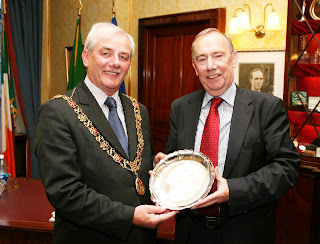Yesterday I went to get a sandwich in the middle of the newsroom rush. One of the annoying things about working in an industrial estate (lovely and all as Northpoint is) is that you have to drive practically everywhere, so I hopped into my car and zipped up to our local garage.
On the way, I listened to Minister for Education Mary Coughlan and the seemingly decontaminated Richard Bruton fighting about bank bonds, the state of the country (that old chestnut) and importing third-level students for the fees.
I had just finished reading an exceptionally depressing article by David McWilliams, suggesting that the country is turning into an economic wasteland, followed by another, by Dan O’Brien, saying that we are now exporting people at a rate of nine in 1,000.
Queueing to pay for my sandwich in the garage, I felt a stab of panic – then guilt – at handing over €3.99 (not including the accompanying packet of crisps, which probably cost about 50 cent). That’s €3.99 you should be saving! You’re lucky to even have a job!
Then, in a mental swerve that astonished even me, a well-known vacillator, I gave myself an invisible pat on the back for doing as we’ve been told and unselfishly spending my hard-earned cash.
I eyeballed the guy behind the counter, and telepathically communicated to him just how glad he should be that I didn’t have any bread in the house this morning, and my €3.99 was now, almost, in his pocket. Keeping people in jobs, now, I was. What a trooper.
But the bit that really got me thinking was my own reaction to an exchange between the guy behind the counter, and someone I must presume was an American tourist who was paying for petrol.
Hank – for we will call him Hank – was having some difficulty paying for his gas. A little confusion over the Chip & Pin machine and some awkward misunderstandings between Hank and the guy on the till eventually led to smiles all round and a successful transaction.
Commercial affairs concluded, Hank turned to the queue – me, Breakfast Roll Man in front of me, and a few more, all patiently waiting – and smiled widely at us.
“Now, just to remember to stay on the left hand side, haha!”
“Haha”, I trilled back, grinning like… well, grinning like something out of a Bord Fáilte ad. And doing my best to look friendly, and, er, Irish.
Breakfast Roll man was too intent on the two Mars Bars, two cans of Coke he was clutching (both 2 for €2 at the moment, special offer) to say anything. An elderly man behind me looked blank.
Now, I’m naturally friendly, something that has landed me in trouble many, many times.
But it wasn’t my natural charm and politeness coming to the fore.
Oh no. It was his money I was after.
Following the nanoseconds of conscience-wrestling in which I decided I needed to buy that sandwich for the good of the nation, my eyes had alighted on Hank (and my ears on his mellifluous twang), and I’d decided that, heck, my money wasn’t enough.
Hank was going to be the one to save us.
So I simpered and grinned like Darby O’Gill. I’m not happy about it. But I didn’t say anything beginning with ‘begorrah’.
Hank was going to be the one to save us.
So I simpered and grinned like Darby O’Gill. I’m not happy about it. But I didn’t say anything beginning with ‘begorrah’.
And Hank, if you’re reading this? I hope you had a lovely drive. Begorrah.


